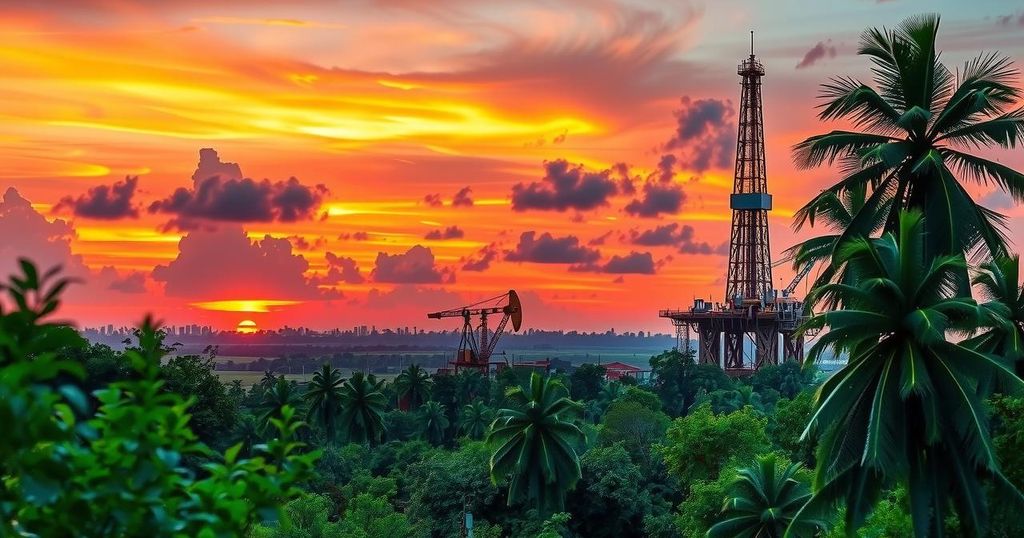World news
ABOP, AFP, ALLIANCE, AMERICAS, ASIA, BOUTERSE, CHINA, DEMOCRACY, DES, DESI BOUTERSE, ELECTION, GENERAL LIBERATION, GENERAL LIBERATION AND DEVELOPMENT PARTY, GOVERNANCE, GOVERNMENT, MEXICO, NATIONAL DEMOCRATIC PARTY, NDP, NORTH AMERICA, PARAMARIBO, PROGRESSIVE REFORM PARTY, RONNIE BRUNSWIJK, SANTOKHI, SOUTH AMERICA, SURINAME, TOTALENERGIES, VHP
Michael Grant
0 Comments
Suriname Votes in Parliamentary Elections to Navigate Oil Wealth
Suriname held parliamentary elections on Sunday to elect representatives who will manage the country’s anticipated oil wealth. President Chan Santokhi expressed optimism over potential economic gains while the nation grapples with debt and poverty. Fourteen parties are competing, with results expected by late Sunday. Suriname celebrates its 50th year of independence from Dutch rule this November and maintains a focus on environmental sustainability amidst new oil discoveries.
Suriname is set to elect a new parliament as voting commenced on Sunday, with the outcome expected to shape how the nation utilizes an imminent oil windfall. The parliamentary elections will determine the fate of 51 members who will later select the president and vice president for the next five years. The incumbent President Chan Santokhi expressed optimism about the country’s transformation, underscoring the significance of offshore oil discoveries that could potentially uplift the lives of Suriname’s approximately 600,000 residents.
This small nation, recognized as the only one in the Americas with Dutch as its official language, confronts challenging economic issues. Suriname grapples with significant debt, soaring inflation, and poverty levels affecting roughly one in five citizens. However, anticipated profits from recent oil discoveries indicate a possible economic turnaround. “It will be a huge amount of income for the country,” President Santokhi remarked.
The elections unfold as Santokhi’s Progressive Reform Party (VHP) faces competition from multiple parties, including the left-wing National Democratic Party (NDP), associated with former president Desi Bouterse, who passed away last year. Additionally, the General Liberation and Development Party (ABOP), led by Vice President Ronnie Brunswijk, stands in the mix. No party appears to have a clear advantage, leaving analysts uncertain about the results.
With offshore oil reserves posing a lucrative prospect, experts project Suriname could net billions within the next two decades. In partnership with French conglomerate TotalEnergies, a $10.5 billion project aims to extract oil at a field offshore, expected to yield 220,000 barrels per day starting in 2028. In anticipation, the government has initiated a “Royalties for Everyone” fund to distribute oil revenues directly to its citizens.
Sunday’s election features fourteen parties in total, each vying for a stake in this transformative moment for the nation. Furthermore, Suriname commemorates 50 years of independence from the Netherlands later this year, marking a milestone in its journey towards self-governance. The country has progressively aligned with China, embracing its Belt and Road Initiative, while countering increasing influence from the United States.
Suriname, with over 90% of its land covered in forests, retains an environment supporting a negative carbon footprint. President Santokhi reaffirmed the government’s commitment to balance economic growth with environmental sustainability, emphasizing, “We know fossil energy is limited…but we can use our oil windfall for the transition towards the green energy we need.”
As provisional results were expected following the polls on Sunday, Suriname stands on the brink of potential economic transformation. The fate of the government in harnessing its emerging oil wealth will shape the future for generations to come.
As Suriname’s citizens cast their votes, the outcome of the parliamentary elections will be pivotal in determining how this small nation navigates its newfound oil wealth. With significant financial potential on the horizon, the new government will face the challenge of addressing pressing economic issues while ensuring sustainable growth. The date of the results will mark a significant turning point, possible leading to unprecedented transformations for Suriname.
Original Source: www.rfi.fr




Post Comment